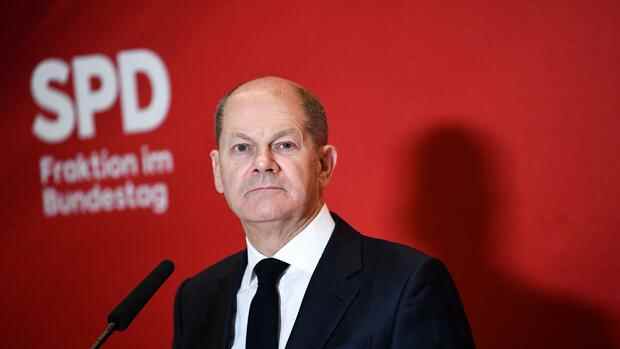His image of the crisis manager is beginning to crack.
(Photo: Reuters)
Olaf Scholz is not yet in office when the likely future Federal Chancellor is already struggling with the first crisis. The SPD man likes to define himself as a politician who anticipates future developments earlier than anyone else, who thinks things like Chancellor Angela Merkel from the end. But there was little to be seen of forward-looking corona policy at Scholz either. The image of the crisis manager is cracking.
Even before his inauguration, Scholz was taking revenge on the fact that he remained vague in the election campaign and did not develop a pandemic strategy, but at the same time made daring promises. For example, that there will be no new nationwide lockdown.
It is precisely this approach to things that will cause Scholz problems in day-to-day government business. Because there are some parallels between Scholz’s corona policy and the other election promises.
Stable pensions, higher investments with a solid financial policy at the same time, the fight against climate change – all of the noble goals should be possible without additional burdens, without cuts for the individual. But this “security in transition” that Scholz promises to the citizens is deceptive.
Top jobs of the day
Find the best jobs now and
be notified by email.
The future chancellor has a choice: Either he breaks election promises and produces disappointments. Or he cheats his way through and postpones decisive decisions – at the expense of the country’s future viability.
First example: climate policy. In the election campaign, Scholz shortened the social task of the century to an “industrial project”. Motto: The economy has to change, the individual citizen doesn’t have to.
But of course every citizen will have to make his or her contribution to overcoming the climate crisis. Of course, everyone will feel the burden of the climate change. Either in the form of higher energy prices or because every citizen subsidizes the ecological restructuring of the economy through their tax money. The fight against climate change is not just an industrial project, it will trigger hard social conflicts over distribution.
Stable pensions as a means of defense against populists à la Trump
Second example: pension policy. For Scholz, stable pensions are a crucial defense against populists à la Trump. However, Scholz himself uses a kind of Trump rhetoric when he tries to convince voters that stable pensions can be raised in times of an aging surge without higher social contributions or higher taxes.
Third example: financial policy. The traffic light will invest more without breaking the debt brake, promises Scholz. He administered similar sedative pills to stability-oriented Germans in European politics. The EU debt rules are also allegedly not in need of reform.
However, the traffic light negotiations show that these promises cannot be kept either. The SPD, the Greens and the FDP are feverishly looking for ways to circumvent the debt brake. Juggling billions over financial levers and financial vehicles is sometimes reminiscent of the financial acrobatics of some financial managers before the financial crisis.
And to leave the debt rules as they are in Europe would mean either causing an economic bloodbath in southern Europe or de facto overriding the rules when the sanctions are never actually applied.
Perhaps Scholz may succeed in hovering presidential over the coalition like Merkel and successfully shifting the responsibility for failures onto others or simply postponing projects: the Greens failing to achieve climate targets, easing the debt rules to the political constraints in Europe, the Sustainability of the pension system in the future. But this would not do justice to his responsibility for the country.
More: New proposal: With this tax reform, the traffic light would relieve 99 percent of the population
